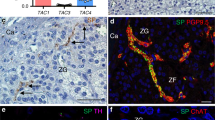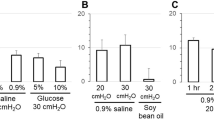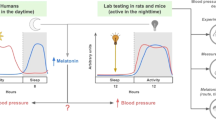Abstract
BOTH renin and oxytocin augment the renal excretion of water, sodium, and potassium in rats. When these substances are injected simultaneously, the increase of diuresis is approximately equal to the sum of the amounts excreted when they are given separately. This effect is the same, even when the dose of renin is large enough to elicit a maximum excretory response within the first 2 h (ref. 1). Besides showing that oxytocin affects the output of electrolytes by a mechanism different from renin, these experiments would appear to support the assumption that oxytocin enhances the elimination of sodium by counteracting the effect of aldosterone. It has been shown that a dose range of 2.5–5 mu of oxytocin neutralizes the sodium-retaining activity of 1 µg of aldosterone2. Moreover, recent investigations by Bartter et al.3, Mulrow and Ganong4, and Kaplan and Bartter5 have demonstrated that renin, through its ability to release angiotensin, stimulates aldosterone secretion. In view of aldosterone's sodium-retaining potency, it was expected that this hormone would counteract the effect of either renin or oxytocin on sodium excretion. But contrary to the expectation, aldosterone was shown to facilitate the action of renin in the experiments here described.
This is a preview of subscription content, access via your institution
Access options
Subscribe to this journal
Receive 51 print issues and online access
$199.00 per year
only $3.90 per issue
Buy this article
- Purchase on Springer Link
- Instant access to full article PDF
Prices may be subject to local taxes which are calculated during checkout
Similar content being viewed by others
References
Croxatto, H., Labarca, E., Cofré, G., and Moreno, R., Arch. Biol. and Med. Exp., Santiago de Chile (in the press).
Barnafi, L., Rosas R., de la Lastra, M., and Croxatto, H., Amer. J. Physiol., 198, 255 (1960).
Bartter, F. C., Casper, A. G. T., Delea, C. S., and Slater, J. D. H., Metabolism, 10, 1006 (1961).
Mulrow, P. J., and Ganong, W. S., Yale J. Biol. Med., 33, 386 (1961).
Kaplan, M. N., and Bartter, F. C., J. Clin. Invest., 41, 715 (1962).
Braun-Menendez, E., Fasciolo, J. C., Leloir, L. F., Muñoz, J. M., and Taquini, A. C., Renal Hypertension (C. C. Thomas, Springfield, Ill., 1946).
Croxatto, H., Zamorano, B., Bazáes, S., Labra, I., San Martin, M. L., and Ortiz, S., Rev. Canad. Biologie (in the press).
Croxatto, R., and Foradori, A., Arch. Biol. and Med. Exp., Santiago de Chile (in the press).
Peart, W. S., and Brown, J. J., Lancet, i, 28 (1961).
Genest, J., Koiw, E., Nowaczynski, W., and Leboeuf, G., Proc. Soc. Exp. Biol. and Med., 97, 676 (1958).
Author information
Authors and Affiliations
Rights and permissions
About this article
Cite this article
CROXATTO, H., LABARCA, E. & COFRÉ, G. Effects of d,l-Aldosterone on Renal Excretion of Water, Sodium, and Potassium induced by Renin. Nature 199, 182–183 (1963). https://doi.org/10.1038/199182a0
Issue Date:
DOI: https://doi.org/10.1038/199182a0
This article is cited by
-
Potentiating effect of aldosterone on the diuretic action of atrial extract
Experientia (1987)
Comments
By submitting a comment you agree to abide by our Terms and Community Guidelines. If you find something abusive or that does not comply with our terms or guidelines please flag it as inappropriate.



